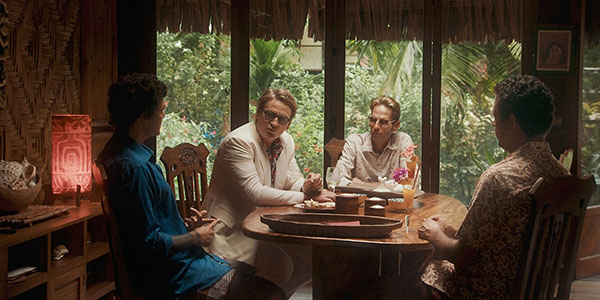Albert Serra’s latest feature, Pacifiction, mesmerizingly blends thriller genre tropes with surrealism to put the audience into a dread-induced hypnotic trance.
Catalan filmmaker Albert Serra has been a favorite at the fall film festival circuit for the last couple of years. Each time he has a new project, he makes his way to a grand festival and makes a vast impression. His style and directorial approach are pretty difficult to explain. There is this sort of poshness in his features and a sense of elegance, but it is self-stylized and quite minimalist at the same time. The style of filmmaking matches his attitude in all senses. His most recognized works center around esteemed figures, some of them inspired by the people around them from the past centuries (17th and 18th). He uses his fascination with classiness and refinement to test the audience by detangling reality from the known history of the central figures of each of his films – Casanova (Story of My Death, 2013), Louis XIV (The Death of Louis XIV, 2016), and Duke of Walchen and Count de Tesis (Liberté, a film that caused major critical division).
This year, however, he managed to outdo himself, both visually and atmospherically. Serra prepared a feature that transforms his “fixation” (although that may be a strong word) with central figures with power, or those who start to notice their lack of such, with Pacifiction (its title taken on the combination of three words: pacification, pacific, and fiction) – making its North American Premiere at this year’s Toronto International Film Festival (TIFF). After dealing with themes of power and decadence in a past time and centering around royalty, Albert Serra ditches the 17th century to tackle our modern times. And by choosing the present as its setting, he wants to look at how the world has changed compared to what happened in France back then. Serra embarks on a dramatic venture of corruption, malign influence, and the current geopolitical landscape, where there are talks of nuclear and financial misbehavior that bring a chill down the main character’s spine.
Pacifiction is set on the largest Polynesian island in the South Pacific archipelago, Tahiti, where a French government official, De Roller (Benoît Magimel, who delivers monologues in a manner that puts the audience in a surrealist hex) lives, with this ironed white suit, floral shirt, and blue tinted glasses. Ultimately, he’s trying to keep things in order between the locals and the political doings taking place there. However, his role is more of a guise: he is “trying” to keep the peace, but it is more so managing things to his and the higher-ups’ benefit. Although he has upright manners and is always carefully calculating each of his decisions, De Roller frequents various nefarious places around the island, especially one owned by a man named Morton (Sergi López). De Roller is planning to build a casino, but as the days go by, he becomes increasingly paranoid that nuclear testing is taking place on the island.

He glimpses a submarine, and navy men constantly appear in the nightclubs, along with a mysterious man with slicked back hair. Serra once again blends cinematic sensibilities with past history, as the French government, during the 70s and 80s, used to test nuclear weapons near those Polynesian islands. While doing some of his daily commissions and assignments, De Roller begins to play detective around the island. De Roller starts to track the sinister activity, either by himself or with the help of the locals. As time passes, he begins to realize that no matter what he does, there’s nothing De Roller can do – he is essentially useless and ponders his impotence in terms of power. The man works for forces greater than himself: he’s only a mere cog in the machine. The characters in the film have conversations, some of which last a long time, about philosophy and politics – how the two intertwine with one another and are always in conflict – in a calm manner: there’s no melodrama in sight.
It might seem that these talks don’t explain the mysteries in the narrative but add depth and psychological insight into the leading players in the film. We get to see the different mindsets and personas, the ones who are indifferent (the higher-ups) and the extremely worried on the inside (De Roller). Dwelling on political paranoia and the possibility of apocalyptic despair, Pacifiction may be considered a nightmarish film, juxtaposing its glossy pastel look and aesthetics, as well as the perfect rays of sunshine of the dream-like locations. Nonetheless, what’s fascinating is the extent of the darkness embalmed within the exotic landscapes. Since it is a dazzling film, visually, one might think that its depths of darkness aren’t going to be as strong, at least to the point of reaching a state of hopelessness. Yet, it has a sinister and sort of melancholic element lurking around in the atmosphere.
This link between the gloomy atmosphere and ritzy style causes a dread-induced haze, in which the characters bask (primarily Magimel’s M. De Roller) as the film’s story slowly develops through its lengthy runtime of almost three hours. Serra experiments with thriller genre tropes and blends them with a slight touch of surrealism to shower the scenery with paranoia and the darkness and dread caused by the inevitability of evil and the character’s existential angst and loneliness. There’s also social commentary about the remnants of colonialism through the moments of silence and the fever-dream-esque cinematic kinetics. Albert Serra hides a pot-boiling thriller amidst a nightmarish haze, contrasting with its ethereal fantasy location. On the one hand, it is his most accessible film, but, on the other hand, it has his self-stylized demeanor. Although he’s not covering actual death, unlike in his 2013 and 2016 features, Serra demonstrates the demise of a man’s spirituality. The film is about a person who seems to be of power yet is ultimately worthless when he notices the bigger picture.
Pacifiction may be a strange experience because of the way it orchestrates its mood and tone, beautifully drenched by its melancholic pacing. The film was mesmerizingly shot by cinematographer Artur Tort on thirty-five-millimeter print, and the imagery is just ravishing, taking you in and out of a latent hymn while the island (and De Roller) descends into augury hell. You might not grasp all its metaphors and parallels to reality in one sitting, and plenty of people will be infuriated by Pacifiction. Still, it is a cinematic experience worth indulging in. It’s Albert Serra’s best work to date, and it’s absolutely brilliant.
Pacifiction premiered at TIFF on September 9, 2022. The film will be released in US theaters by Grasshopper Films from February 17, 2023 and in UK cinemas by New Wave Films on April 21.

